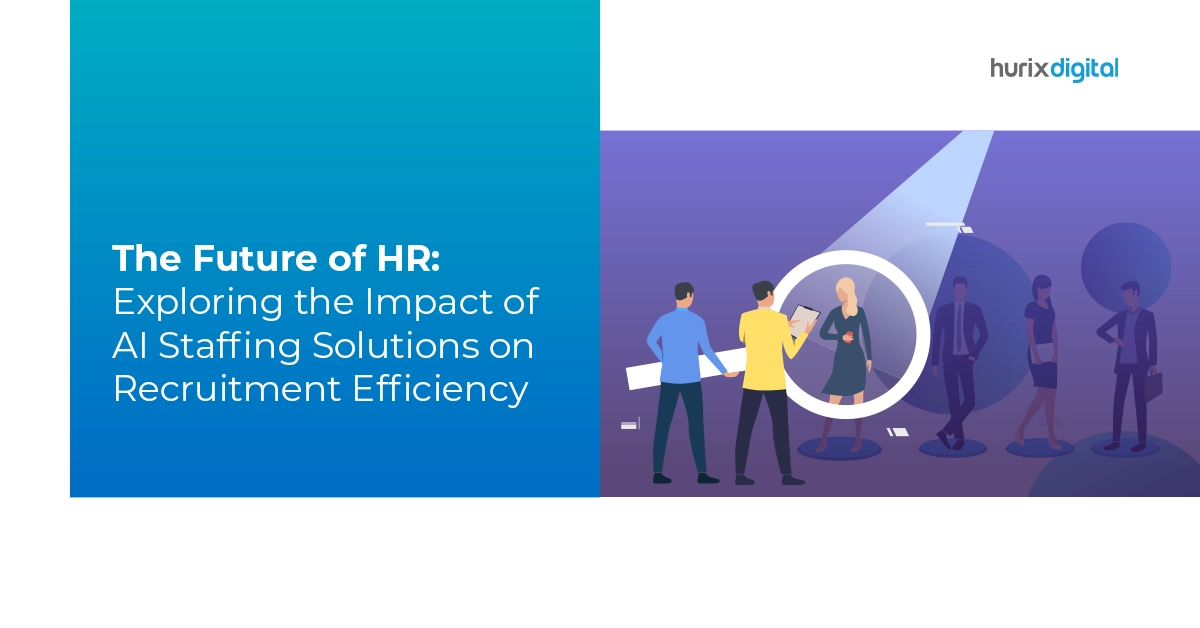The Future of HR: Exploring the Impact of AI Staffing Solutions on Recruitment Efficiency
The HR department has been evolving for years. From a mere administrative role to taking on a consultative and advisory presence, HR has been quite the change-maker. But now, as technology develops, we find ourselves asking what the future of HR looks like.
With the rapid proliferation and impact of generative AI, by 2033, AI solutions will result in more than half a billion net new human jobs. Here is where a robust staffing solution and an even more potent HR team will be crucial.
AI in HR services is here, and it’s all about recruitment and selection.
AI solutions in the recruitment industry are capable of helping companies find the best talent that fits their requirements, helping them achieve their business goals.
Some AI talent acquisition systems use machine learning capabilities, which have improved over time and are better equipped to deal with job-seekers expectations than ever before.
Table of Contents:
- How Can AI Staffing Solutions Help in the Recruitment and Selection of Candidates?
- Artificial Intelligence Recruiting Software- How it Works?
- Exploring the Impact of AI Staffing Solutions on Improving Recruitment Efficiency
- Key Takeaways
How Can AI Staffing Solutions Help in the Recruitment and Selection of Candidates?
Recruitment is the backbone of any organization, and companies must find the right people for the job.
While there are many different aspects of recruiting, one of the most important parts is finding candidates that suit your business needs and culture. Unfortunately, this can be a very time-consuming process.
However, AI has been making huge strides in recent years, and now there are many automated solutions available to help businesses find the right candidates for their jobs. AI Staffing solutions use machine learning algorithms to analyze data from various sources — including social media — and make predictions about future events such as employee turnover or performance management reviews.
They can also automate certain aspects of the hiring process, such as scheduling interviews or sending emails to candidates who have applied for positions. About 76% of HR leaders believe that they will lag in organizational success if they don’t adopt AI solutions in 12-24 months.
Also Read: The Future of Staffing Solutions: AI and Automation
Artificial Intelligence Recruiting Software- How it Works?
The first thing you need to know about AI recruiting software uses an algorithm based on logic and data points to make decisions about hiring decisions for companies as virtual assistants.
Human recruiters can leverage artificial intelligence tools by feeding them information about candidates, including resumes, cover letters, work samples, and social media profiles. These tools then use that data to predict which candidate would be best suited for a specific role within a company or organization based on their previous experience, education level, skill set, and more.
By selecting the most qualified candidates based on pre-set criteria set by human recruiters or managers, AI recruiting software saves both time and money in employee engagement and retention. AI staffing solutions can automate part or all of the hiring process, allowing organizations to scale operations while maintaining quality control.
Exploring the Impact of AI Staffing Solutions on Improving Recruitment Efficiency
Let’s take a look at four ways that AI staffing solutions can improve recruiting efficiency:
1. Streamlining Applicant Screening Processes
Applicant screening is the most time-consuming part of the recruitment process. It requires data analysis, manual review, and decision-making. AI solutions can automate much of this work, allowing recruiters to focus on high-value activities and spend more time with candidates.
For example, AI systems can take over repetitive tasks such as scanning resumes, screening resumes and rejecting unqualified candidates. They also allow companies to analyze large volumes of data more quickly to identify the most relevant candidates for each job opening.
Finally, they can help streamline the entire recruitment process by providing an overall view of available talent that’s constantly updated in real-time.
2. Automating Tedious Tasks Like Scheduling Interviews
One of the biggest challenges recruiters face is managing their time, as well as finding candidates who are available for an interview at the right times.
If a candidate accepts an interview request and then cancels last minute, it can be difficult for a recruiter to find another time slot that works for both parties. AI staffing solutions will be able to take on this task for you, saving you time and frustration so you can focus on other aspects of your job.
For example, when a candidate submits their resume through a career site, they can also apply for roles straight from their dashboard. This will automatically push them into a queue for the position so that it doesn’t fall through the cracks.
3. Improving Candidate Experience through Automation
The concept of ‘employee experience’ has gained traction in recent years as companies strive to create a workplace culture that’s more than just comfortable — it’s exciting. Employees who feel valued and respected are more likely to stay at their jobs, which means an easier time finding new hires.
An AI staffing solution automates the often tedious process of reviewing resumes and scheduling interviews so human resources teams can focus on creating a positive candidate experience.
For example, the average hiring cycle takes about 52 days from start to finish — but that doesn’t mean all those days are productive ones for your company or its employees. Predictive analysis uses historical data to predict how long it will take to fill a role based on factors like previous recruiting cycles and current openings in other departments. That way you can adjust your strategy accordingly and ensure that every applicant gets an interview within 48 hours of applying.
4. Cost-effective talent acquisition
Costs are so high because it’s not easy to find qualified candidates who are also a good fit for your organization’s culture and needs. It takes time to review resumes, conduct interviews, reference checks, and more — time that could be better spent on other things if you had an automated solution that helped you find the right person faster.
With automation comes cost savings across the board, and this includes recruiting costs too. For instance, if you have a large number of candidates applying for roles on your website and career site, then AI staffing solutions can filter out those who don’t match your requirements so that you only need to review a small number of applications per week or month.
Also Read: Analyzing the Future of AI in HR and Staffing Solutions
Key Takeaways
Human resource departments are responsible for recruiting new talent and managing the talent pool within a company. With AI’s inevitable automation of numerous HR tasks, such as shortlisting applicants and scheduling interviews, it will place human resources in a much better position to focus their energies on the original purpose of their department: the people.
By letting AI handle the more menial tasks, the Human Resources department will be able to develop better hiring strategies and implement them in larger numbers.
The future of HR is rapidly changing, and it will be shaped by a barrage of new technologies and digital platforms. We’ve only begun to scratch the surface with AI, and it’s exciting to think of what future applications in recruitment could be like. If you’re looking to stay ahead of your competitors and grow your business, it’s time to consider recruiting automation solutions from Hurix Digital.
Connect with us to know more about impact of AI staffing solutions on recruitment.

SVP & Head – Hurix Technology Solutions
Global Delivery head with 25 years of working experience in NYC investment banks and fintech companies. Hands-on technology delivery management and program management, accountable for stakeholder relationships, Strategic roadmap, P&L, Revenue growth, Account Management, and employee satisfaction.









